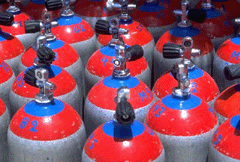| Ch 1. Basics | Multimedia Engineering Fluids | ||||||
|
Mass Density |
Ideal Gas Law |
Viscosity |
Surface Tension |
Vapor Pressure |
|||
| Ideal Gas Law | Case Intro | Theory | Case Solution |
| Chapter |
| 1. Basics |
| 2. Fluid Statics |
| 3. Kinematics |
| 4. Laws (Integral) |
| 5. Laws (Diff.) |
| 6. Modeling/Similitude |
| 7. Inviscid |
| 8. Viscous |
| 9. External Flow |
| 10. Open-Channel |
| Appendix |
| Basic Math |
| Units |
| Basic Fluid Eqs |
| Water/Air Tables |
| Sections |
| eBooks |
| Dynamics |
| Fluids |
| Math |
| Mechanics |
| Statics |
| Thermodynamics |
| ©Kurt Gramoll |
|
|
||||||||||||||||||||||||||||||||||||||
|
Table: Gas Constants for the Problem
|
The conditions of the gases are given as follows:
The mass of each gas can be determined by the ideal gas law: m = pV/RT m = (1000)(0.25)/(0.2598)(290) For nitrogen, the gas constant R is 0.2968 kJ/kg-K. The mass of the nitrogen in a single tank is m = (850)(0.25)/(0.2968)(290) For carbon dioxide, the gas constant R is 0.1889 kJ/kg-K. The mass of the carbon dioxide in a single tank is m = (1,250)(0.25)/(0.1889)(290) = 5.705 kg The total weight of the tanks is then given by Wtotal = weight of empty tanks + weight of gases |
|||||||||||||||||||||||||||||||||||||
